
The Bottom Line
Introduction & Drive Details
After reviewing Corsair's awesome Force MP600 Gen4 SSD at the 1TB capacity point, we came away very impressed and crowned it as our flash-based performance champion for AMD's Zen 2 platform. The Phison E-16 powered 1TB MP600 had everything we look for in a tier 1 SSD, except for one thing - high capacity. Something with enough capacity to hold our entire steam library.
More capacity is always better, or is it? Sure, we all want 2TB M.2 SSDs, but with few exceptions we end up trading a fair amount of performance when we go from 1TB class to 2TB class M.2 SSDs. In fact, the last time we can remember a 2TB M.2 SSD being the fastest capacity point of its respective series, was when Samsung's 960 Pro hit the market.
Since then, 2TB capacity M.2 NVMe SSDs have had one thing in common - they are significantly slower than their 1TB siblings. We don't mind a tiny bit slower, but that's not what we've been seeing as of late. There is typically enough of a performance hit to make us think twice about how much we are willing to sacrifice for an extra terabyte of capacity.
We want it all. The best performance, with that glorious additional terabyte of storage built right in. We want it, and now we may have finally found a 3-bit, 2TB M.2 NVMe SSD that gives us the best of both worlds. On our bench today, we have Corsair's version of Phison's E16 PCIe Gen4 x4 SSD. Corsair's Force Series MP600 is an M.2 2280 PCIe Gen4 x4 NVMe SSD available in 500GB, 1TB and 2TB models. Let's dive in and take a closer look:
Drive Details
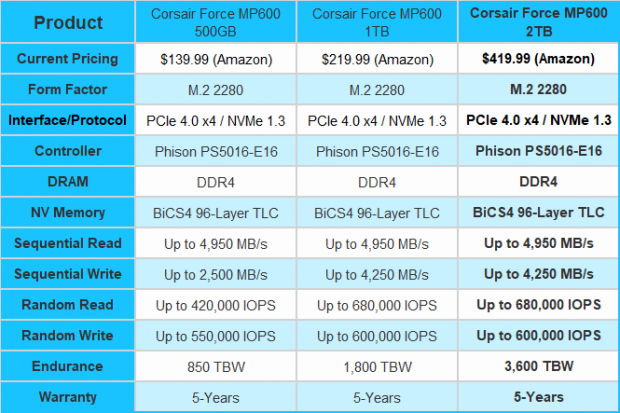
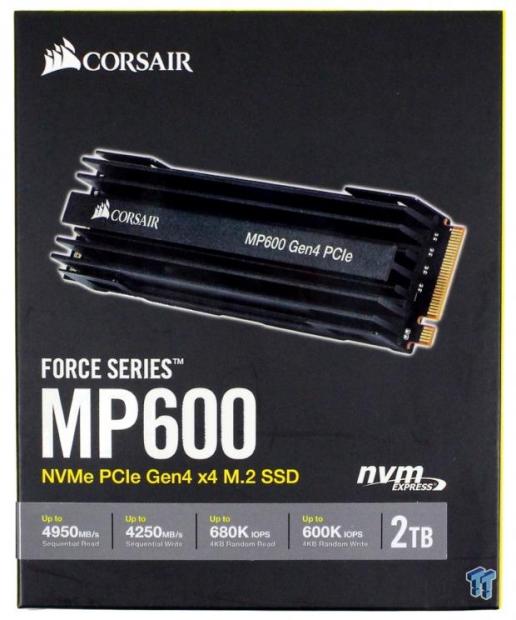
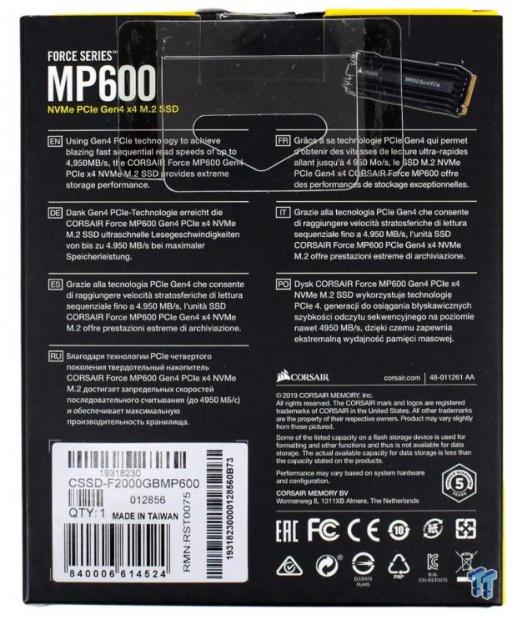
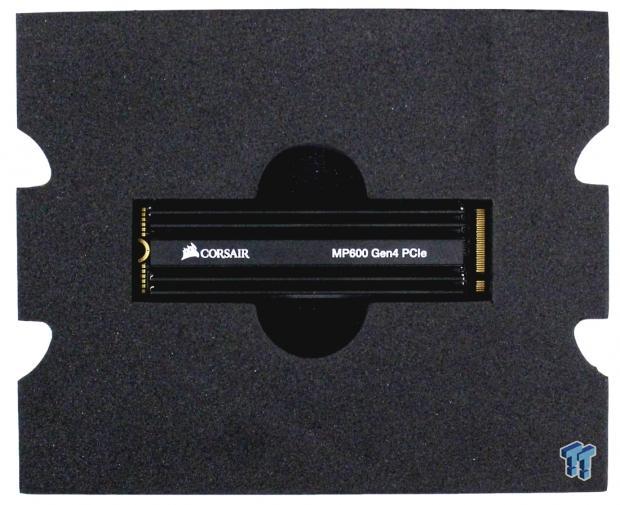
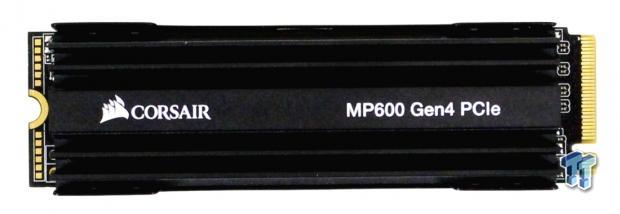
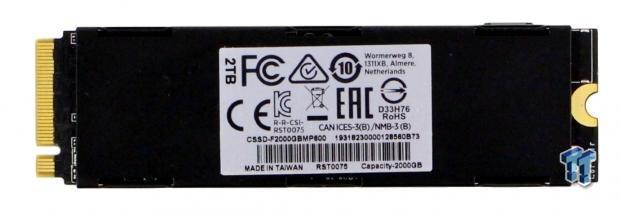
Corsair protects the MP600 from potential shipping damage by cradling the MP600 in a dense foam carrier. The drive features a substantial all-aluminum heat sink that is attractive and functional. The heat sink really isn't necessary for everyday computing, it is provided mainly for users who run extended heavy workloads. If you need to remove the heat sink it comes off easily, so you can install the SSD under your motherboards integrated M.2 heat sink.


To test how the drive performs without the heat sink we monitored temps as we filled the drive with 798 gigabytes of 80/20 data. Our open-air test bench has zero airflow, so this is close to a worst-case scenario. The controller did heat up 25c more than with the heat sink, but it did not throttle, nor did it reach throttling temps. With this result we are confident that mainstream users do not actually need the heat sink to get throttle free performance.
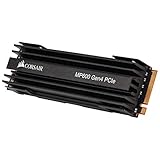
SSD Toolbox
Corsair SSD Toolbox
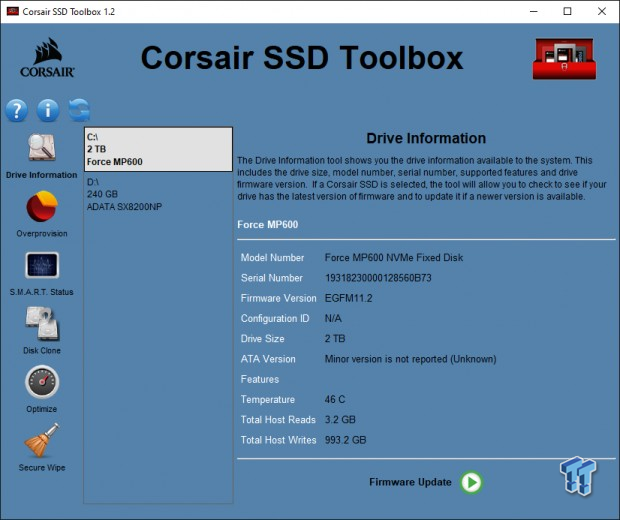
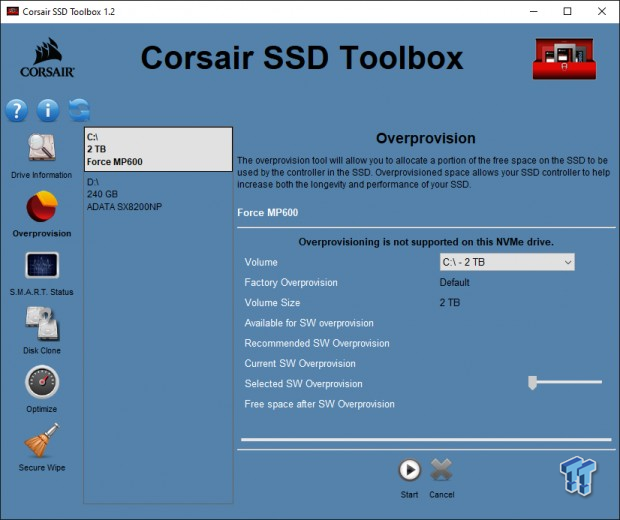
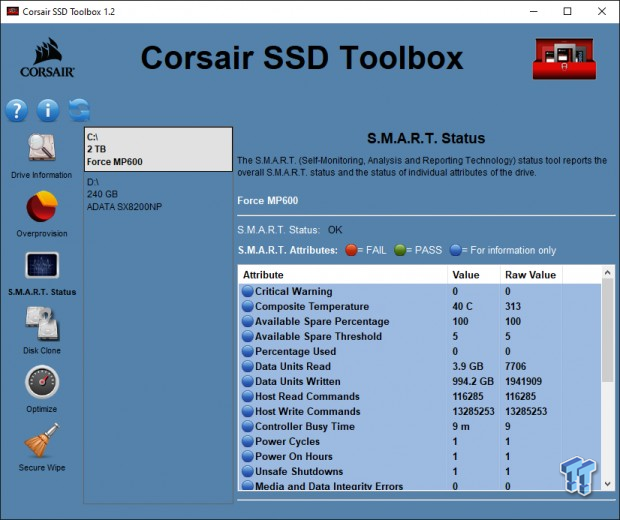
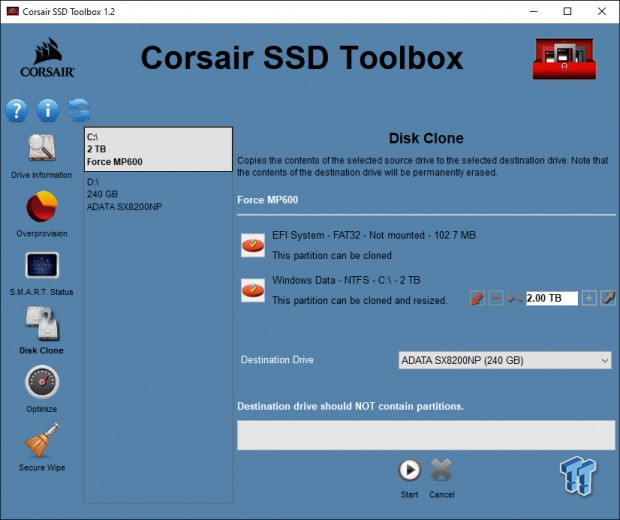
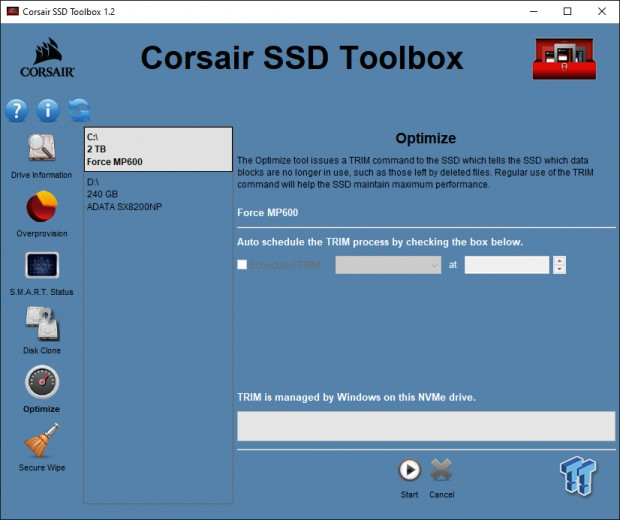
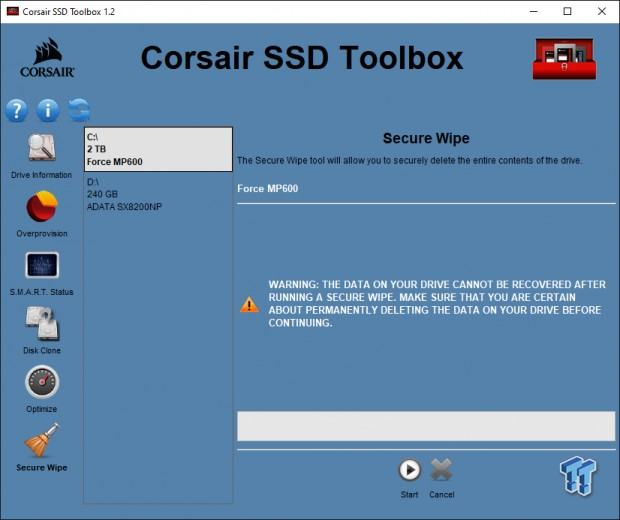
The MP600 is compatible with Corsair's SSD Toolbox. The Toolbox allows you to check the status of your SSD, upgrade firmware, clone and secure erase. Very functional and a nice value-add.
Synthetic Benchmarks: CDM & Anvils
CrystalDiskMark
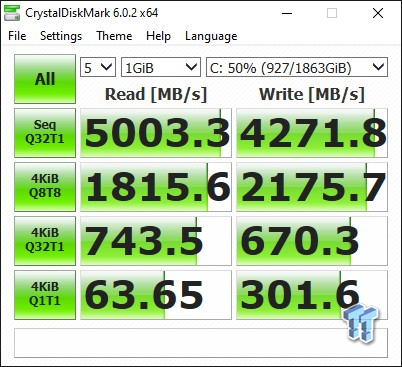
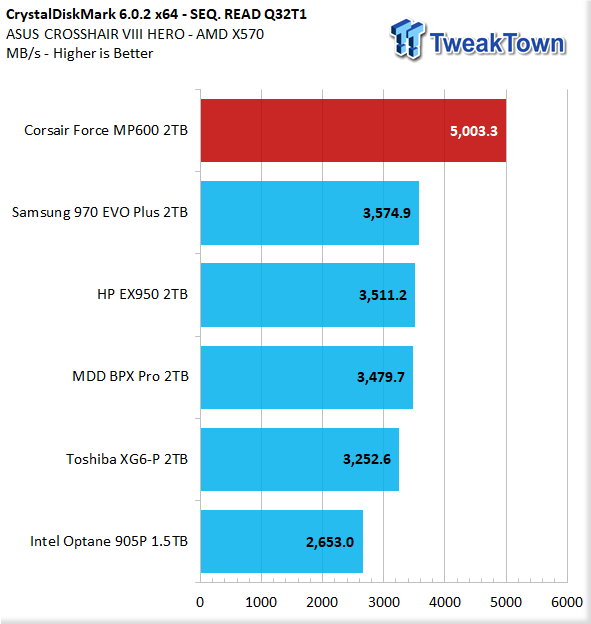
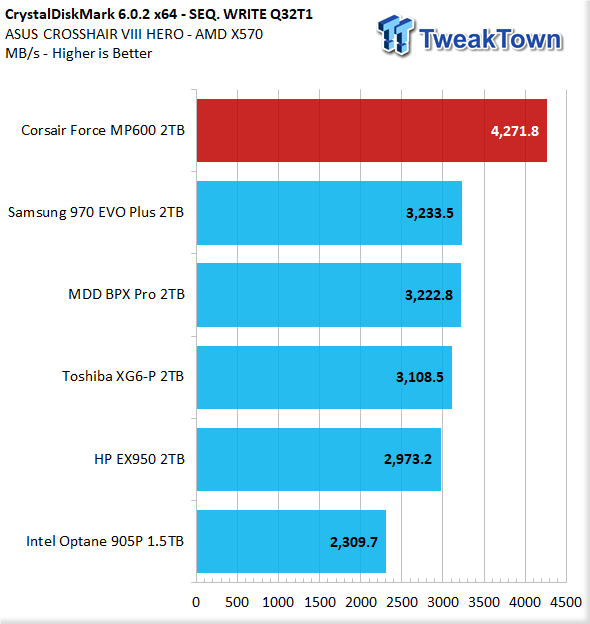
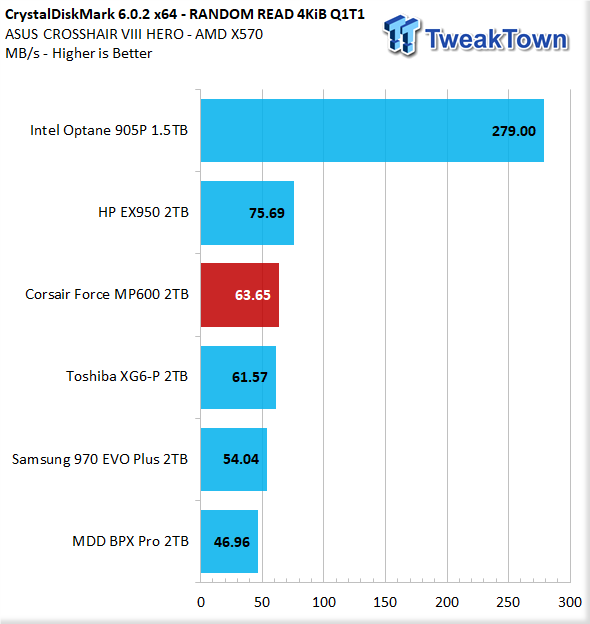
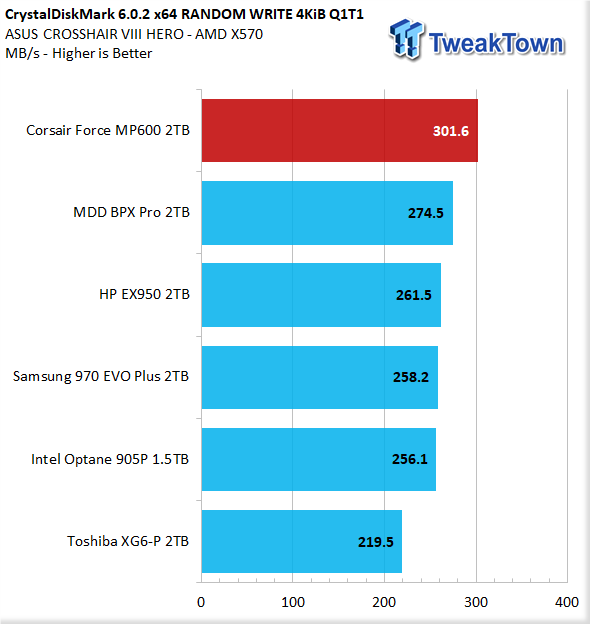
We test all SSDs as our system (OS) disk filled 50% with data. This allows us to closely replicate a typical user scenario. Testing like we do often results in lower benchmark results, however despite our built-in handicap we had no problem exceeding Corsair's factory sequential performance specifications of 4,950MB/s read, and 4250MB/s write.
Anvil's Storage Utilities
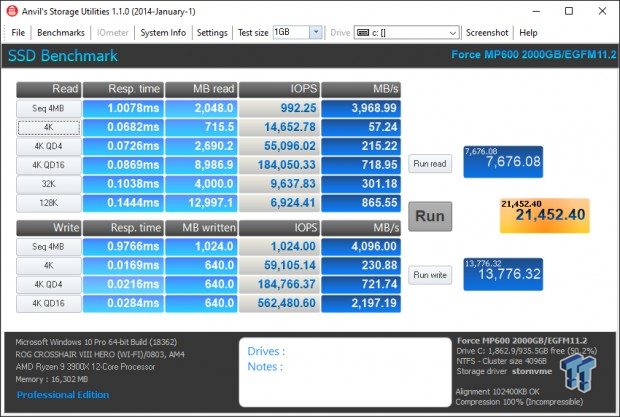
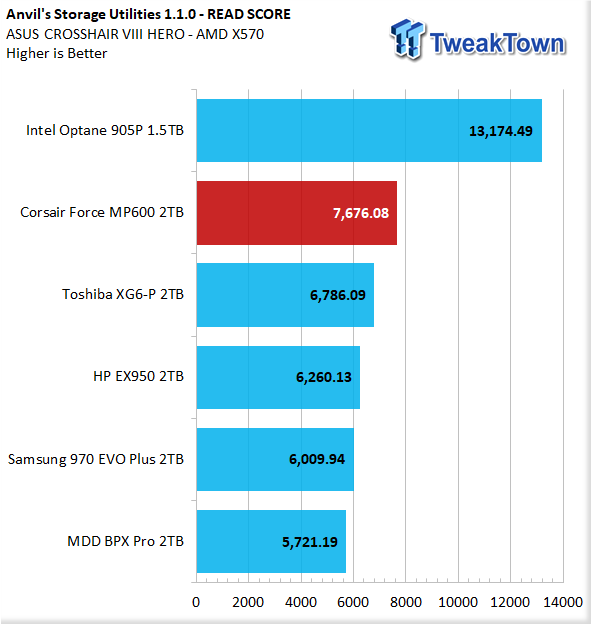
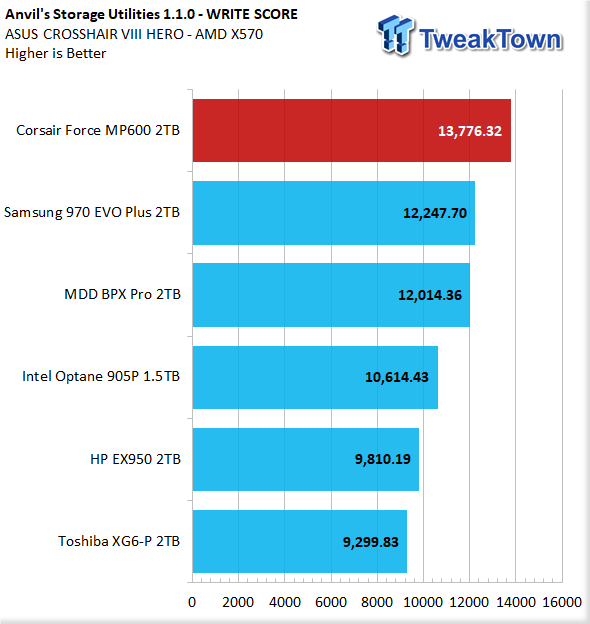
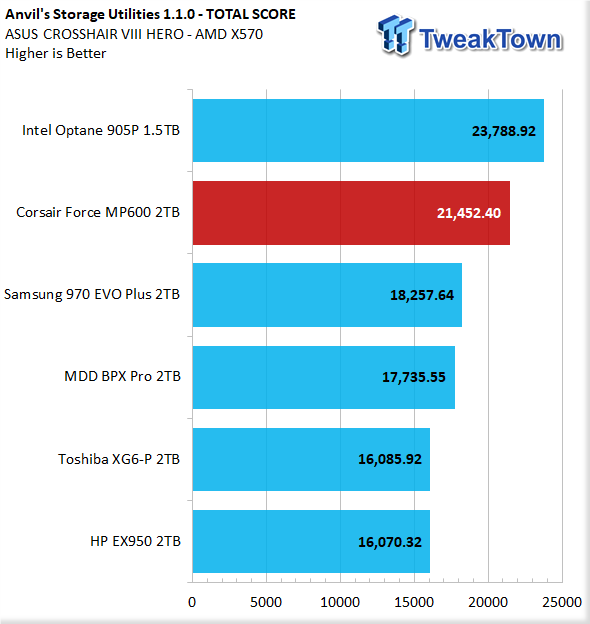
When evaluating SSDs we always place more value on read performance. This also happens to be where we typically see the biggest decline in performance when going from 1TB to 2TB. Not so with Corsair's MP600 2TB. Anvil's read scoring is only slightly lower than the 1TB version. The competition suffers a more drastic reduction in performance compared to their 1TB versions.
Like its 1TB sibling, the MP600 2TB crushes its flash-based competition. Only Intel's Optane 905P can do better but, that is not a flash-based SSD and it costs well over $2000.
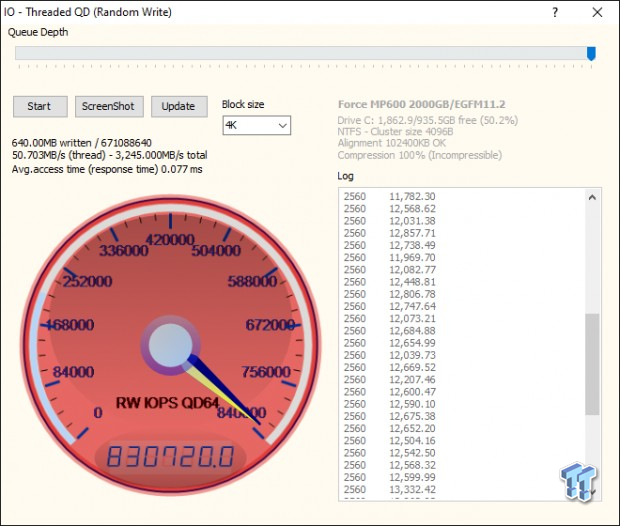
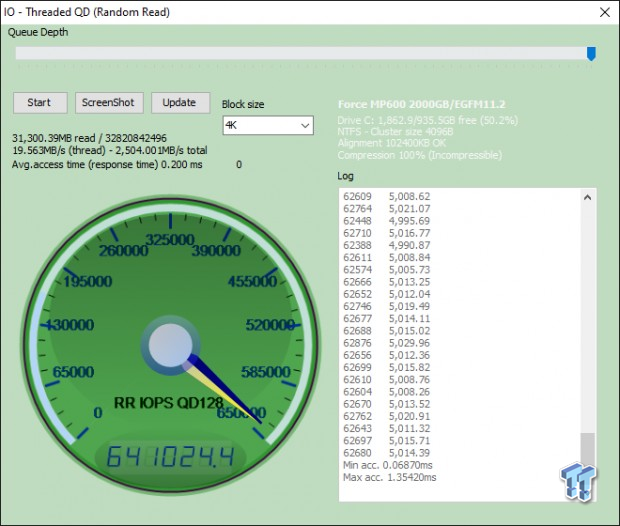
We don't place much importance on max IOPS, we are just showing what the drive can deliver while running in our test-state. 830K write and 641K read with the drive 50% full is outstanding to say the least.
Synthetic Benchmarks: AS SSD & ATTO
AS SSD
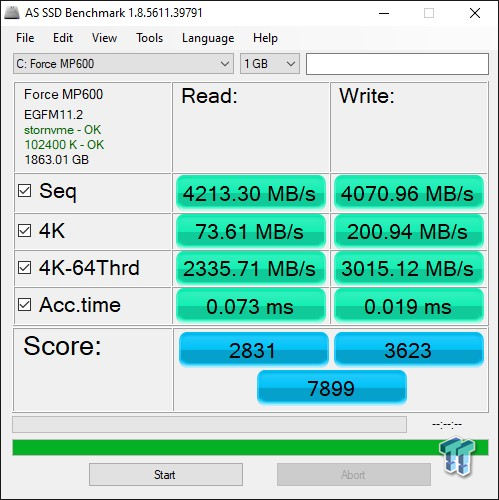
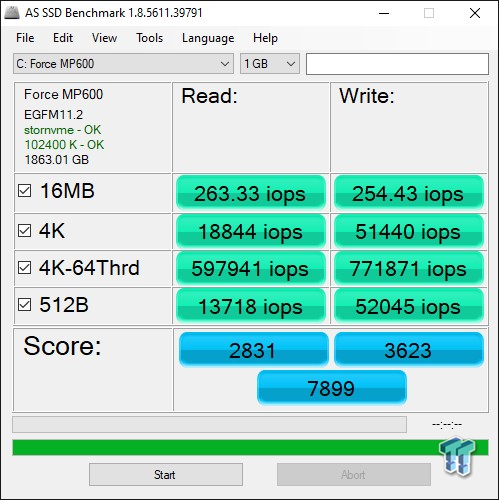
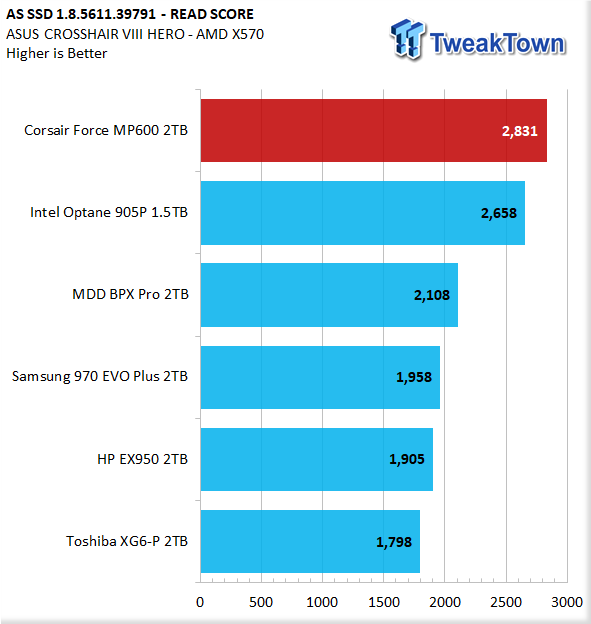
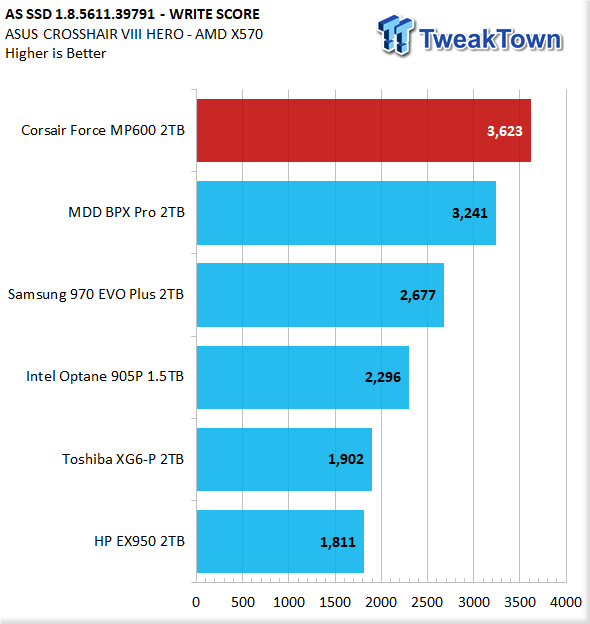
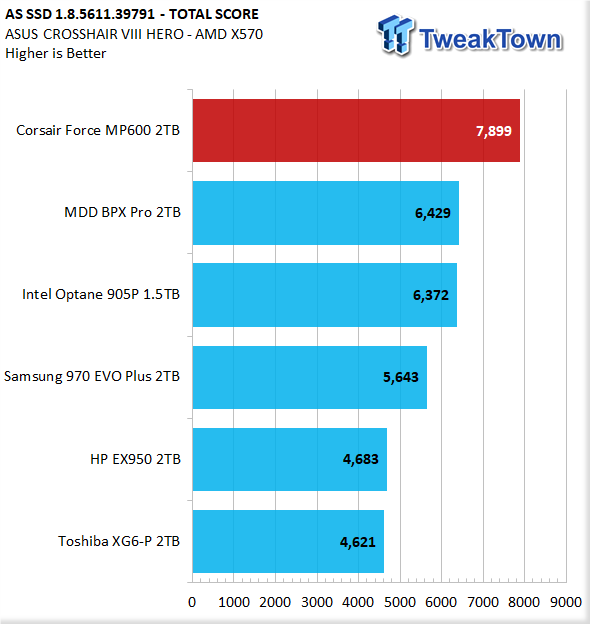
Again, read scoring is what matters. And again, Corsairs MP600 dominates its flash-based competition and even manages to steal away the top spot away from Intel's 905P 1.5TB. On top of that the 2TB MP600 delivers an even better-read score than its 1TB sibling (2,815).
ATTO
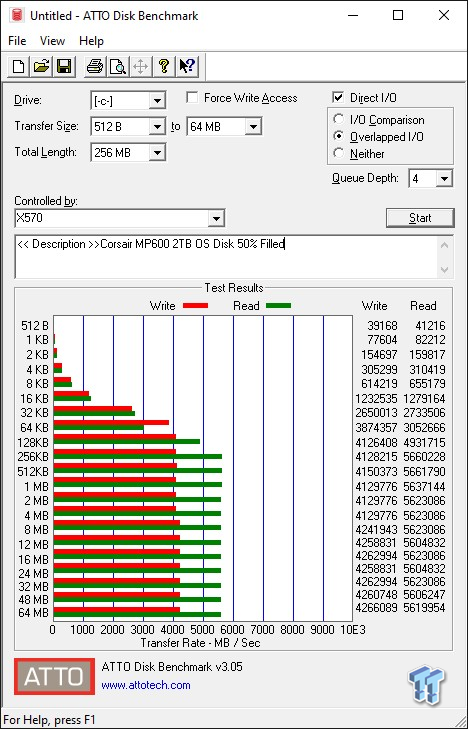
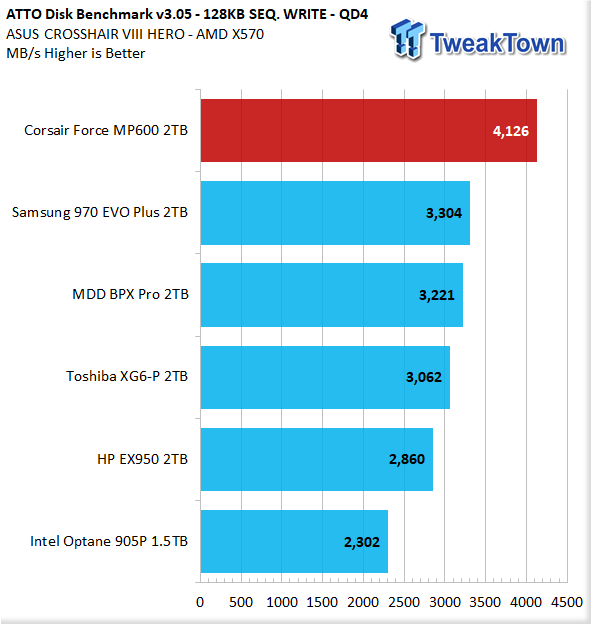
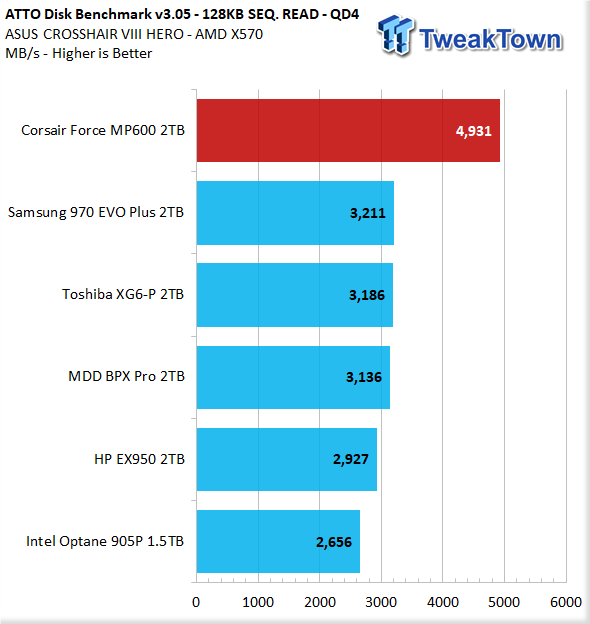
Focusing in on 128KB transfers we find the 2TB MP600 delivering 4,126 MB/s sequential write and 4,931 MB/s sequential read. Both results are massive and only available if you have PCIe Gen4 hardware. These are the same results we saw from the 1TB MP600 and like its smaller sibling the 2TB version is hitting over 5,600 MB/s max sequential read.
Real-World Testing: Game Loading & PCM8
Game Loading
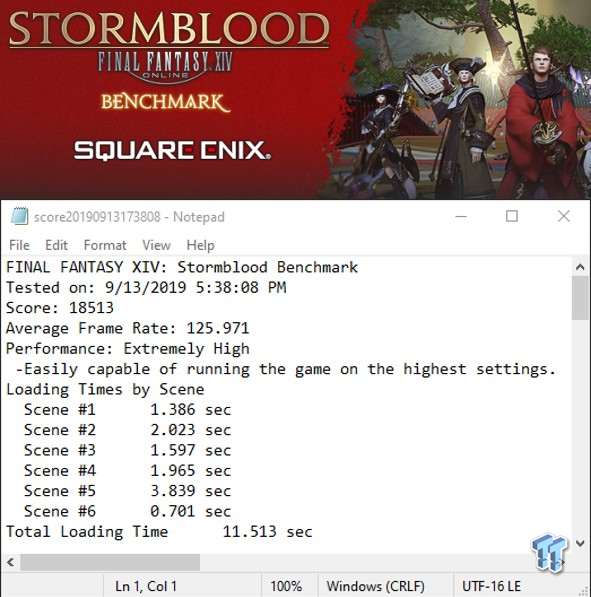
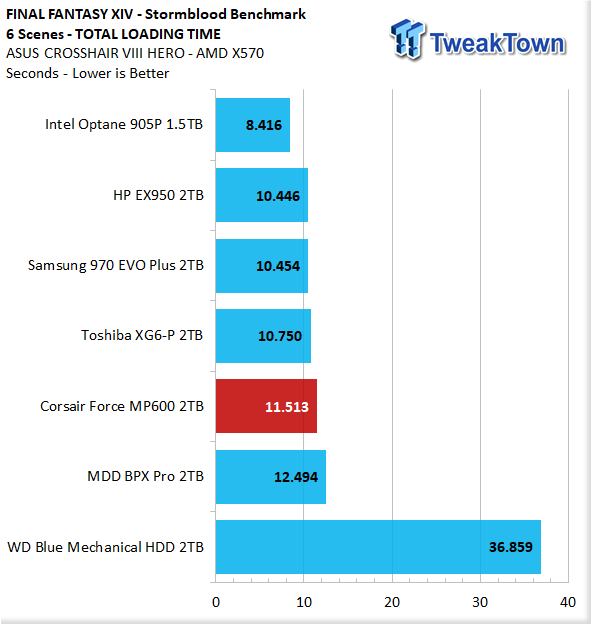
Only about 1 second separates the 2TB MP600 from the top performing flash-based SSD on our chart, so we are not going to ding the MP600 for that. It is still plenty fast and if you factor in how much better it performs in our other tests, this result is rather insignificant.
PCMark 8
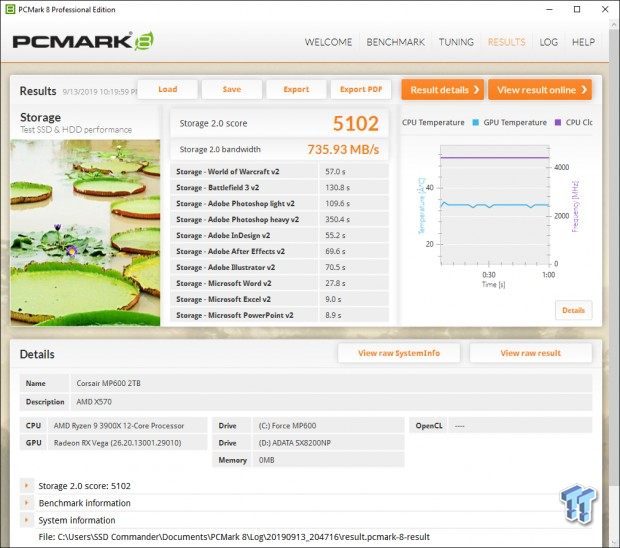
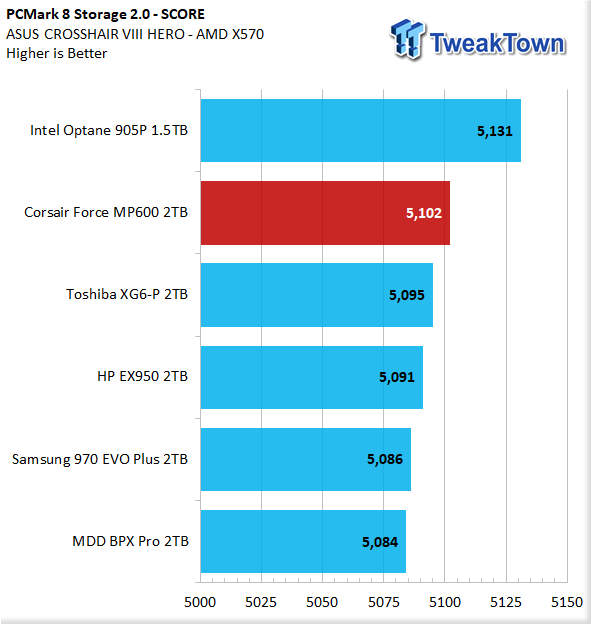
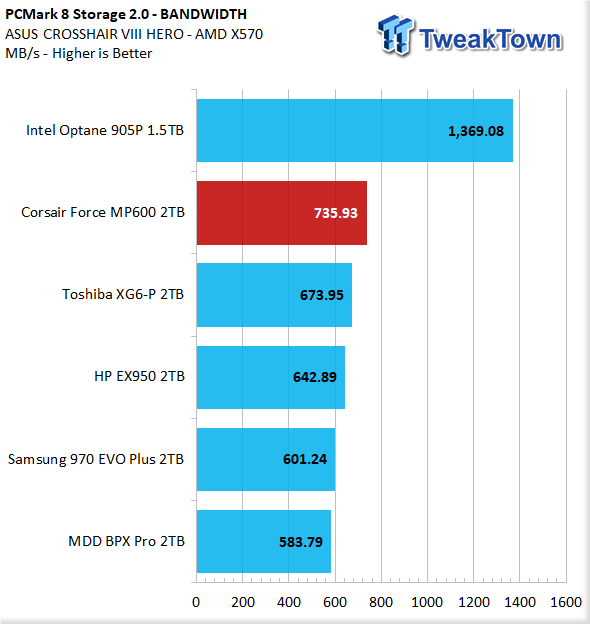
PCMark 8 accurately represents real-world performance which is why we consider it the most important benchmark we run. This is typically where we find the largest performance disparity between 1TB and 2TB models.
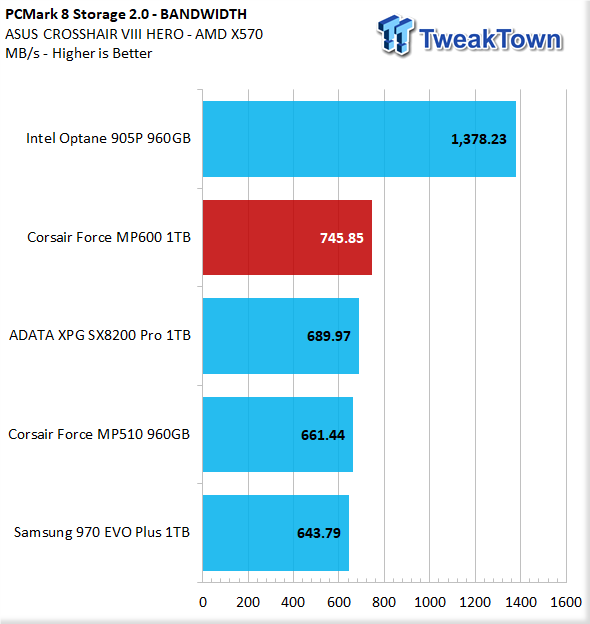
For comparison, we included 1TB SSDs that have the same flash and controllers as those on our 2TB chart.
First let us compare the 1TB MP600 to the 2TB model. We find a difference of less than 10MB/s in storage bandwidth. The next one we can directly compare is Samsung's EVO Plus and we find that the 1TB version is 42.55 MB/s faster. The ADATA XPG SX8200 Pro 1TB and the HP EX950 2TB both use the same flash and controller, so they are comparable. The SX8200 Pro at 1TB is 47.08 MB/s faster than the 2TB EX950 Pro. Finally, the 1TB Corsair Force MP510 and the 2TB MDD BPX Pro both use the same flash and controller, so they are comparable as well. The MP510 1TB is 77.65 MB/s faster than the 2TB BPX Pro.
This is the data we refer to most when we state 1TB SSDs are almost always significantly faster than 2TB versions. Except for the MP600 and the 905P, the 2TB versions of the drives on our chart are between 7 percent and 13 percent slower than their 1TB siblings. By comparison, the MP600 is only a little over 1 percent slower at 2TB than 1TB.
Real-World Testing: Transfer Rates
Transfer Rates
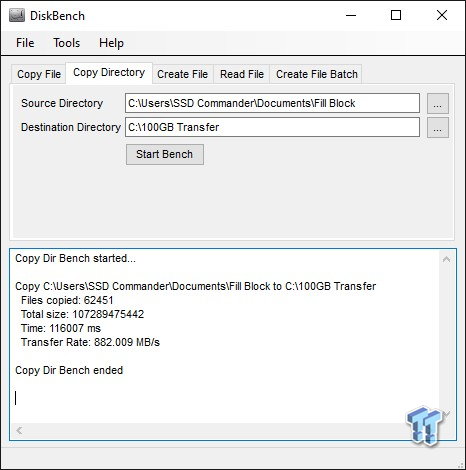
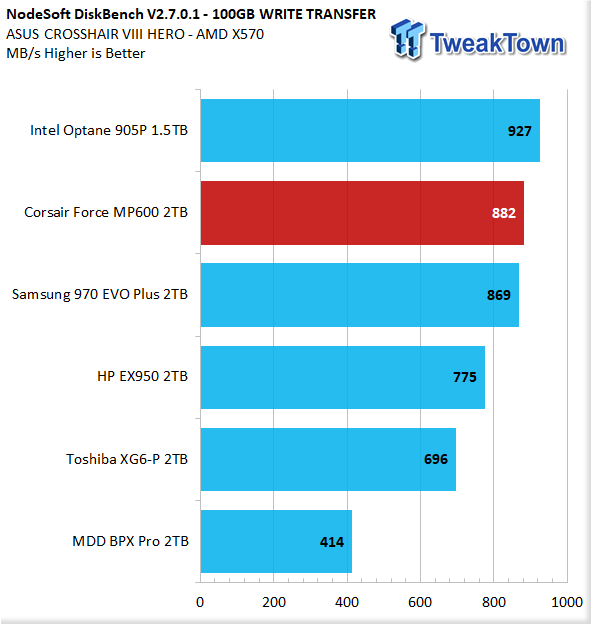
Our write transfer is 100GB in size and composed of more than 62,000 files. Although a bit slower than our flash-based champ the 1TB MP600, the 2TB MP600 still defeats all the flash-based competition. Optane is a little bit faster when writing a chunk of data like this, but not by much.
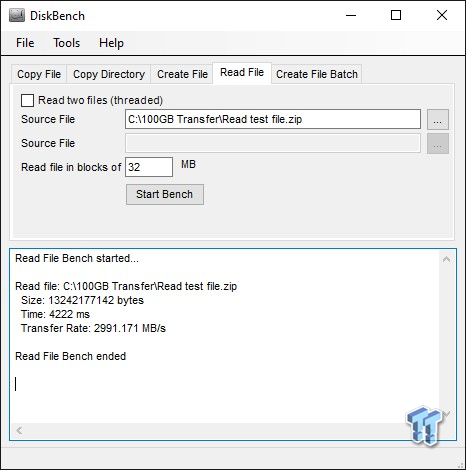
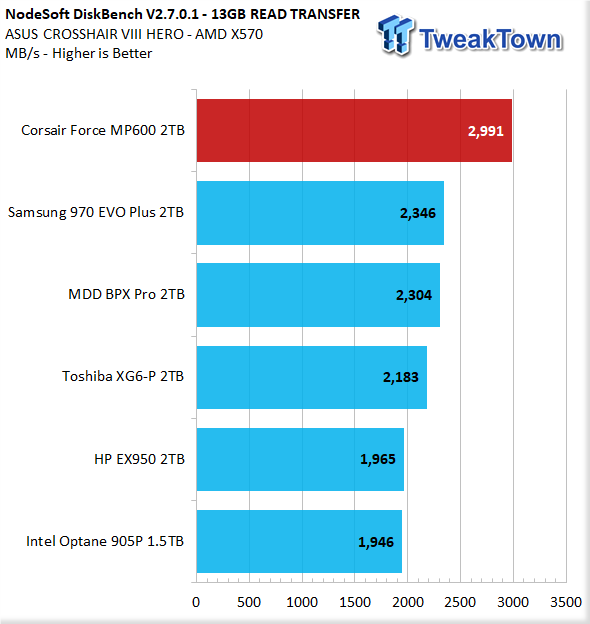
Corsair's MP600 2TB sets a new lab record for read transfers unseating its smaller sibling by exactly 20MB/s. No matter how you look at it, Gen4 SSDs have a big advantage over their counterparts when reading data.
Final Thoughts
As good as the 1TB MP600 is, we like the 2TB model even better. It comes to us as bit of a surprise that we finally have a 3-bit flash-based 2TB M.2 SSD that is just as fast as the 1TB version. No longer do we need to trade performance for capacity.
Corsair's 2TB Force Series MP600 repeated the same feat pulled off by its smaller sibling. Total domination of the flash-based competition when paired with AMD's PCIe Gen4 enabled Zen 2 platform. Phison is the first and only company to ship PCIe Gen 4 SSD's in the consumer space. This was a bold move on Phison's part which seems to have caught the competition off guard and is now paying big dividends for the company.
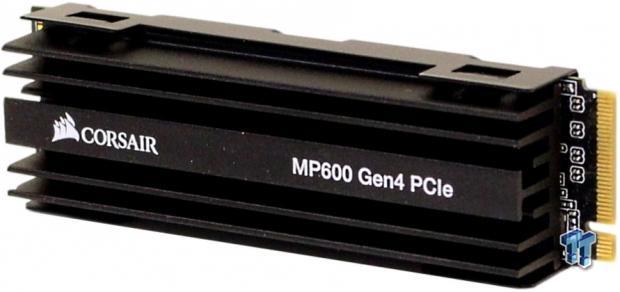
AMD's Zen 2 platform has taken the PC enthusiast market by storm, out selling Intel at every turn. AMD's rise has directly benefitted Phison because they took the initiative to collaborate with AMD to give the world it's first taste of Gen4 SSD goodness. If you own a Zen 2 platform and you want the best storage performance currently available and high capacity, then look no further than Corsair's 2TB MP600.
Corsair's Force Series MP600 2TB NVMe PCIe Gen4 x4 M.2 SSD is TweakTown approved and highly recommended.
Pros
- Overall Performance
- High Capacity
- High Endurance
- PCIe Gen4
Cons
- None

Performance |
100% |
Quality |
100% |
Features |
100% |
Value |
90% |
Overall |
98% |
Class leading performance and high capacity all-in-one package. Corsair's 2TB MP600 hits the mark big time.

What's in Jon's PC?
- CPU: AMD Ryzen 7800X 3D
- MOTHERBOARD: GIGABYTE AORUS Master X670E
- RAM: Kingston Fury Renegade 7200MHz 32GB
- GPU: ZOTAC AMP Extreme GeForce RTX 4090
- SSD: Crucial T700 2TB Gen5
- OS: Windows 11 Pro
- COOLER: Lian Li Galahad 360 AIO
- CASE: Lian Li Lancool III
- KEYBOARD: Corsair K65 RGB Mini
- MOUSE: SteelSeries AEROX 5 Wireless
- MONITOR: ASUS ROG Strix PG27AQN 360Hz 1440p ULMB2
Similar Content
Related Tags

